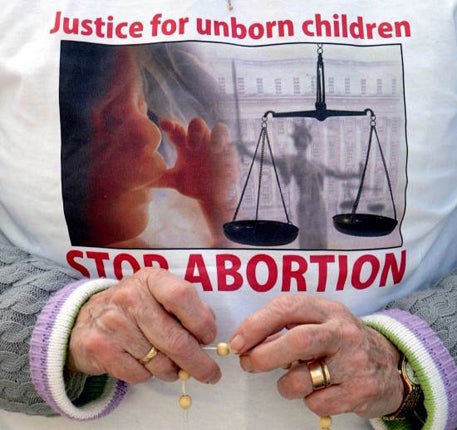Ireland's abortion law 'violated woman's rights'
European court upholds complaint and reopens divisive debate

Your support helps us to tell the story
From reproductive rights to climate change to Big Tech, The Independent is on the ground when the story is developing. Whether it's investigating the financials of Elon Musk's pro-Trump PAC or producing our latest documentary, 'The A Word', which shines a light on the American women fighting for reproductive rights, we know how important it is to parse out the facts from the messaging.
At such a critical moment in US history, we need reporters on the ground. Your donation allows us to keep sending journalists to speak to both sides of the story.
The Independent is trusted by Americans across the entire political spectrum. And unlike many other quality news outlets, we choose not to lock Americans out of our reporting and analysis with paywalls. We believe quality journalism should be available to everyone, paid for by those who can afford it.
Your support makes all the difference.A European court yesterday found that Ireland had violated the rights of a pregnant woman who complained that the country's restrictions on abortion had risked damaging her health and possibly her life.
The European Court of Human Rights ruled that in failing to implement the right to a lawful abortion, Ireland had breached the woman's right to respect for her private life.
The ruling by the court in Strasbourg seems destined to reignite an issue that for decades has remained on the political agenda of the Irish Republic, but remains stubbornly unresolved.
Although it has been the subject of divisive referendum campaigns, heated political debates and various emergency court cases, no easy resolution is obvious for what is probably the most fraught issue in Irish society.
The case was taken by three women who complained that Irish restrictions stigmatised and humiliated them, risked damaging their health and, in one case, posed a risk to a mother's life.
The court upheld the complaint of one of the women who was in remission from cancer and had inadvertently become pregnant. She said she believed her pregnancy could cause a relapse of the cancer, and, because she could not obtain clear advice, had decided to have an abortion in England.
The court concluded that the provisions of a law prohibiting abortion constituted "a significant chilling factor for women and doctors" since legal uncertainties meant both ran the risk of a serious criminal conviction and imprisonment.
The woman was awarded damages of €15,000 (£12,700).
Campaigners reacted to the judgment with calls for the government to clarify the law. However, the present Fianna Fail government is in its last months, with elections due early next year.
In Irish law, abortion is prohibited by a criminal law of 1861 which stipulates that any pregnant woman or third party intending to cause a miscarriage may be jailed for life. But a 1992 Supreme Court ruling held that abortion was lawful in Ireland if it meant there was a real and substantial risk to the life, as distinct from the health, of the mother.
The courts have also given permission for teenaged girls to travel to England for terminations in cases where they were raped or carried foetuses which could not survive. In this, they were following in the footsteps of more than 5,000 Irish women and girls who annually travel to England and Wales for abortions.
The Irish Prime Minister, Brian Cowen, said that the decision of the court was "clearly a very important judgment that raises a number of issues that will have to be carefully considered".
The Irish government sent Attorney General Paul Gallagher to contest the women's case, which he claimed was "a significant attack" on the health service and the treatment, advice and support it offered.
He argued that Irish laws rested on "profound moral values deeply embedded in Irish society".
Reaction yesterday to the judgment gave a foretaste of the emotions which the continuing abortion debate can be expected to generate.
Niall Behan, of the Irish Family Planning Association, which supported the case, said: "This is a landmark for Ireland and, in particular, for women and girls. It leaves no option available to the Irish state other than to legislate for abortion services in cases where a woman's life is at risk."
But John Smeaton, of the anti-abortion Society for Protection of Unborn Children, said: "This warped decision lacks all legitimacy. Abortion not only kills children – it is deeply damaging to women."
While the court's conclusion did not include any precise advice on how Irish law might be changed, it reflected what was already known: that abortion regulations lack all clarity. The problem is that no consensus exists in Ireland as to how clarification should be introduced, and in what circumstances abortion might be available.
Join our commenting forum
Join thought-provoking conversations, follow other Independent readers and see their replies
Comments